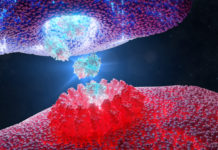An international team of scientists has shown that more than 80 per cent of bowel cancers could be treated with existing drugs. The study found that medicines called ‘JAK inhibitors’ halted tumour growth in bowel cancers with a genetic mutation that is present in more than 80 per cent of bowel cancers. Multiple JAK inhibitors are currently used, or are in clinical trials, for diseases including rheumatoid arthritis, psoriasis, blood cancers and myeloproliferative disorders.
In the U.S. colon cancer is the third most commonly diagnosed cancer, and the second leading cause of cancer death in men and women combined. In Australia, where the study was conducted, bowel cancer is the second-most common cancer, with nearly 17,000 people diagnosed every year, accounting for almost one out of 10 cancer-related deaths.
According to lead author Dr Toby Phesse, more than 80 per cent of bowel cancers were driven by a defect in the Wnt signaling pathway. “This genetic defect triggers a high level of signaling in the pathway, leading to uncontrolled cell growth and therefore cancer,” he said. “Targeting Wnt signaling directly as a treatment for bowel cancer presents several challenges as normal cells in the intestine rely on low levels of Wnt signaling to renew and keep the gut healthy. Blocking Wnt might prevent tumour growth but it could also cause significant damage to the intestines.”
However, tumour cell growth can also be stimulated by another signaling pathway, involving proteins known as JAKs (Janus kinases). The research team examined whether targeting this parallel pathway could limit tumour growth without affecting the normal cells of the intestine.
“Our research showed that blocking JAK proteins could inhibit tumour growth in preclinical models of bowel cancer and human bowel cancer cells that have high levels of Wnt signaling,” Dr Phesse said. “Importantly, we didn’t see any side effects in our preclinical models as Wnt signaling could still function in the normal cells of the intestine, as JAK inhibitors only block cell growth in cells with very high Wnt signaling, such as those found in the tumours. This makes it a very attractive therapy for bowel cancer.”
The study found JAK inhibitors were only effective against bowel cancers that were driven by defective Wnt signaling. Tumours that didn’t exhibit unusually high levels of Wnt signaling – approximately 10-20 per cent of bowel cancers – did not respond to treatment with JAK inhibitors.
Study co-author Michael Buchert said the results were significant, as several JAK inhibitors have been approved for clinical use for other diseases. “Clinical trials have already shown that JAK inhibitors are safe for human use,” he said. “We hope that this will enable our research to rapidly reach clinical trials for bowel cancer patients and deliver benefits in the near future.”
Source: T. J. Phesse, M. Buchert, E. Stuart, D. J. Flanagan, et.al. Partial inhibition of gp130-Jak-Stat3 signaling prevents Wnt- -catenin-mediated intestinal tumor growth and regeneration. Science Signaling, 2014; 7 (345): ra92 DOI: 10.1126/scisignal.2005411
Journal Link: http://bit.ly/1sMl7H8















